We’ve all been there, lying awake with thoughts racing. The moon casts shadows across the walls. For many, getting a good night’s sleep feels like a dream. Recent stats show that 1 in 3 adults don’t get enough sleep1.
In our fast-paced world, finding natural sleep remedies is key. Fruits for sleep are a tasty and healthy option. From bananas to tart cherries, these fruits have nutrients that help us sleep better. Adding these fruits to our evening routines can help us sleep better.
Key Takeaways
- 1 in 3 adults do not meet the sleep guidelines, highlighting the need for effective strategies.
- Certain fruits, such as bananas and tart cherries, contain melatonin, which regulates sleep.
- Potassium and magnesium found in fruits like avocados promote muscle relaxation and restful sleep.
- Research suggests a positive link between magnesium intake and improved sleep quality.
- Incorporating sleep-friendly fruits into your diet can significantly enhance your overall sleep experience.
- A balanced evening diet should include fruits to help you sleep while avoiding heavy meals before bedtime.
Understanding the Link Between Diet and Sleep
A lot of people in the U.S. struggle with poor sleep. This includes issues like insomnia and sleep apnea2. Studies show that eating well can help improve sleep2. The Mediterranean diet, in particular, is good for sleep because of its nutrients2.
Not following dietary guidelines can lead to shorter sleep times2. Some nutrients, like magnesium and omega-3 fatty acids, help with sleep2. Foods like poultry and dairy also improve sleep2. Plus, eating fatty fish and tart cherries can help too2.
Diets low in fiber or high in unhealthy fats and sugars can hurt sleep3. Eating at regular times is better for sleep than snacking late2. Avoiding caffeine and alcohol before bed is also key3.
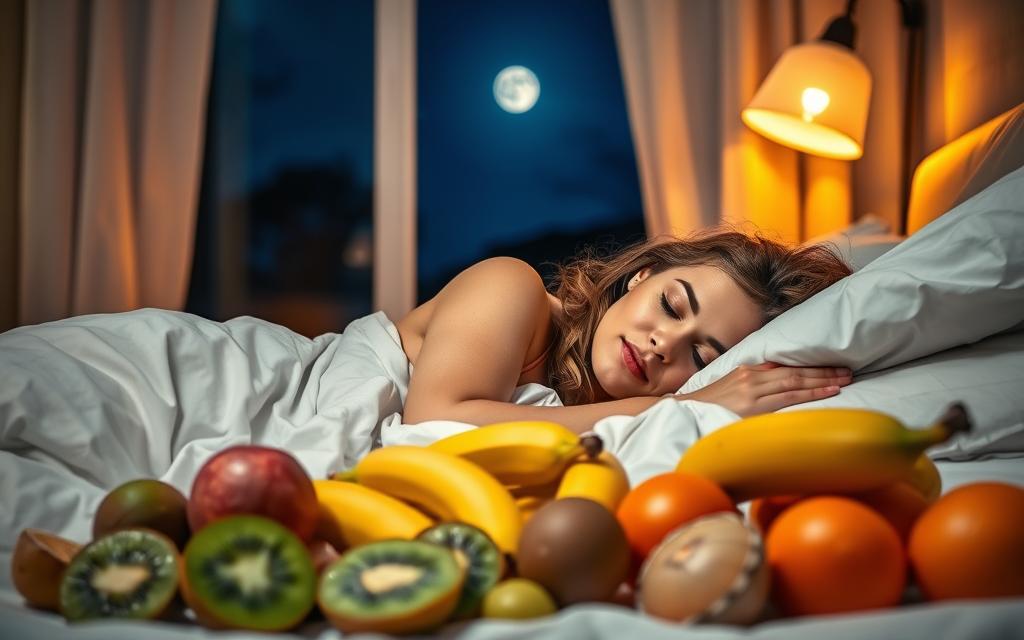
The Mediterranean Diet and Its Benefits for Sleep
The Mediterranean diet is known for its health benefits, including better sleep. It’s rich in fruits, vegetables, whole grains, and healthy fats. These foods help improve sleep quality4. Eating this way boosts nutrient intake, which is key for a good night’s sleep5.
This diet suggests eating more than two servings of vegetables and one to two servings of fruits at each meal. It also includes healthy fats from olive oil, fish, and poultry4. This balanced diet can lead to better sleep, including less time falling asleep and better sleep quality4.
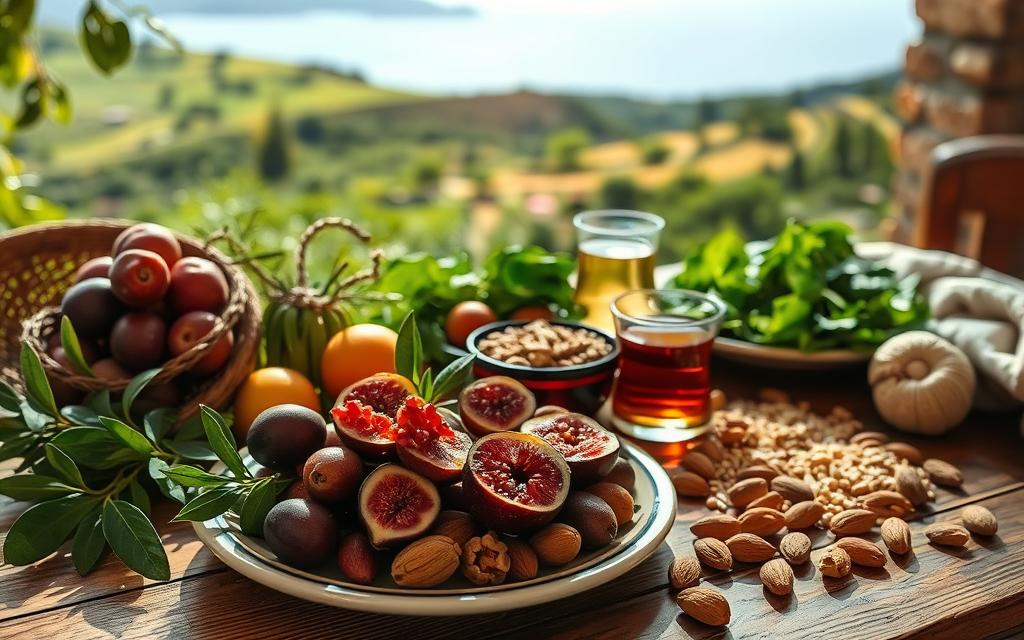
Research also shows that people on this diet sleep more efficiently and feel less tired during the day4. This makes the Mediterranean diet not just good for health but also for sleep. It adds to its many benefits.
How Fruits Impact Sleep Quality
The link between fruits and sleep is becoming more important in nutrition studies. Fruits like kiwi and tart cherries have compounds that might help sleep better. For example, eating two kiwis before bed for four weeks helped adults with sleep issues sleep more and better6.
Tart cherries are full of melatonin, which helps improve sleep6. But, not all fruits have the same effect. Pineapple, apples, grapes, and bananas have melatonin too, but research on their sleep benefits is not as strong as it is for kiwi and tart cherries6.
Women who ate more fruits and veggies saw big improvements in sleep7. Young adults often struggle with sleep, showing they might also benefit from eating more fruits7.
The Mediterranean Diet, rich in fruits and veggies, is linked to better sleep6. This diet shows that eating fruits can be part of a bigger plan to improve sleep.
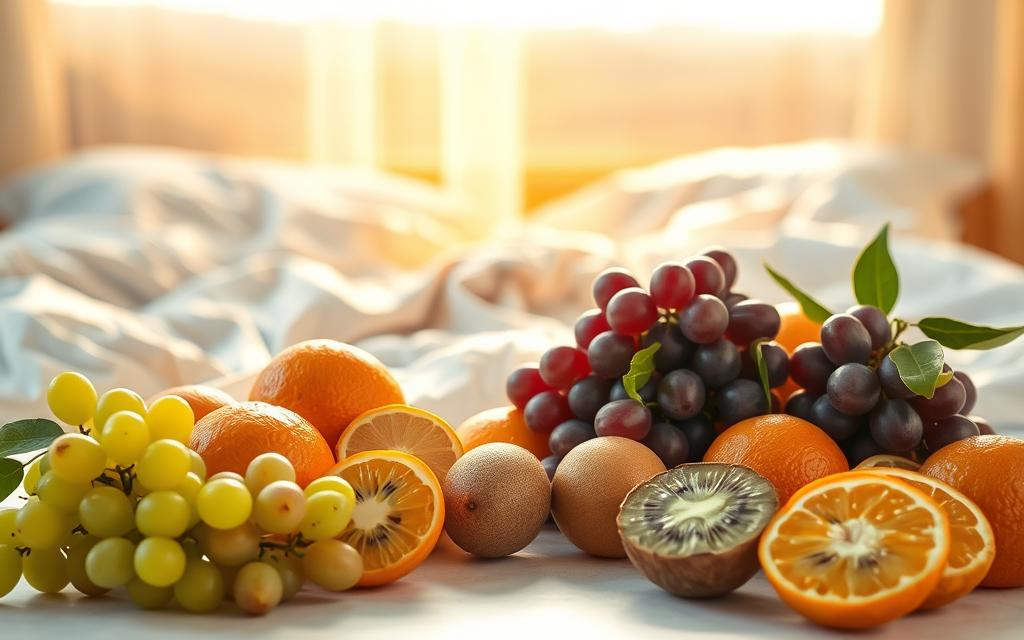
Kiwi: A Natural Sleep Aid
Kiwi is becoming a popular natural sleep aid. It’s packed with serotonin, which helps control sleep cycles. This makes kiwi a great choice for those looking for natural sleep solutions.
Benefits of Serotonin in Kiwi
Kiwi has a lot of serotonin, about 5.8 µg/g. This serotonin is key for making melatonin, the sleep hormone. Low folate levels, found in kiwis, can disrupt sleep. Eating kiwis helps keep folate levels healthy, which can improve sleep.
Kiwi also has lots of antioxidants, like vitamins C and E. These help fight oxidative stress, which can cause sleep issues8.
Study Results on Kiwi Consumption Before Bed
Many studies show kiwi’s sleep benefits. For example, eating two kiwis before bed helped people fall asleep faster. They also slept for 16.9% more over four weeks9.
These studies also found that sleep quality improved by 5.41%. The number of times people woke up at night went down by 28.9%10. This shows kiwi is a natural way to better sleep.
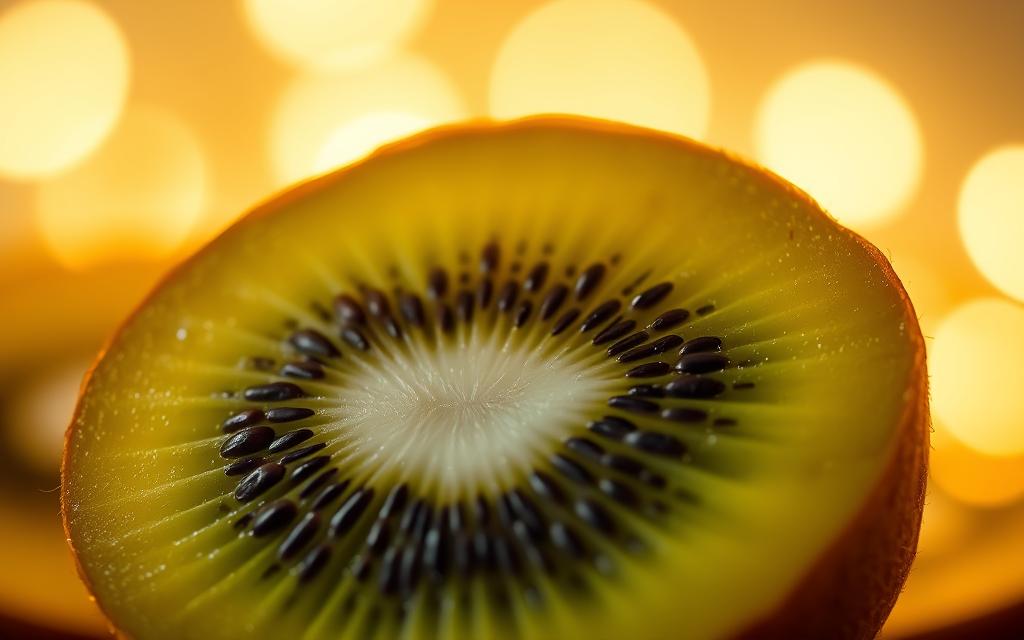
Tart Cherries: Nature’s Melatonin Source
Tart cherries are becoming a popular choice for better sleep. They have lots of melatonin, which helps control our sleep-wake cycle. Studies show that tart cherries improve sleep quality thanks to their antioxidants.
It’s important to know about the antioxidants in tart cherries. Also, how tart cherry juice can help you sleep better.
Antioxidants and Sleep Quality
The antioxidants in tart cherries, like anthocyanins, boost sleep quality11. These compounds reduce inflammation and stress, which can mess with sleep. This makes tart cherries a top snack for better sleep.
They also have vitamins A and C, which are good for health11.
How Tart Cherry Juice Can Enhance Sleep
Research shows tart cherry juice boosts melatonin levels12. A study found that drinking tart cherry juice for a week added 38 minutes to sleep time12. It’s suggested to drink 2-8 ounces a day12.
But, tart cherry juice is sweet and can upset your stomach if you drink too much11. Drinking a bit before bed can help you sleep faster and better12.
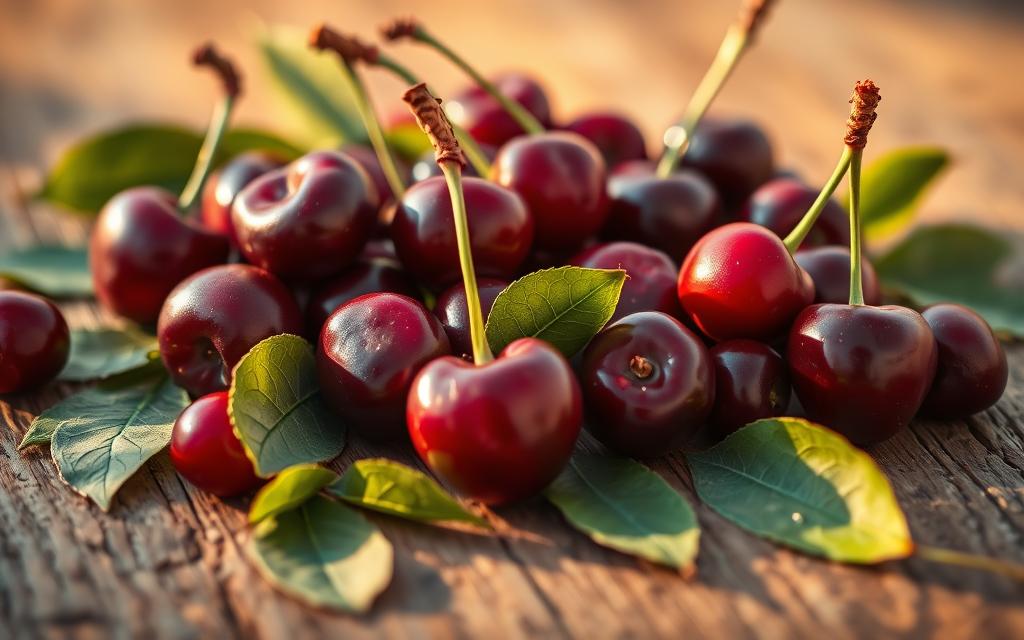
Pineapple: A Fruit with Sleep-Promoting Properties
Pineapple is a tropical fruit known for its sleep benefits. It’s not just tasty but also full of nutrients for better sleep. Its melatonin content is key to better sleep quality.
Melatonin Content in Pineapple
Pineapple has melatonin, a hormone that helps control sleep. Eating pineapple can boost melatonin levels by 266%13. This makes it a great natural sleep aid.
Nutrients That Support Sleep in Pineapple
Pineapple is rich in nutrients that help sleep. One cup of pineapple chunks has 78.9 milligrams of Vitamin C, which is 88% of the daily value (DV)14. It also has 0.185 milligrams of Vitamin B6, or 11% of the DV14.
Pineapple is also a good source of Potassium and Magnesium. These minerals help relax muscles14. Each of these nutrients makes pineapple a top sleep-friendly fruit.
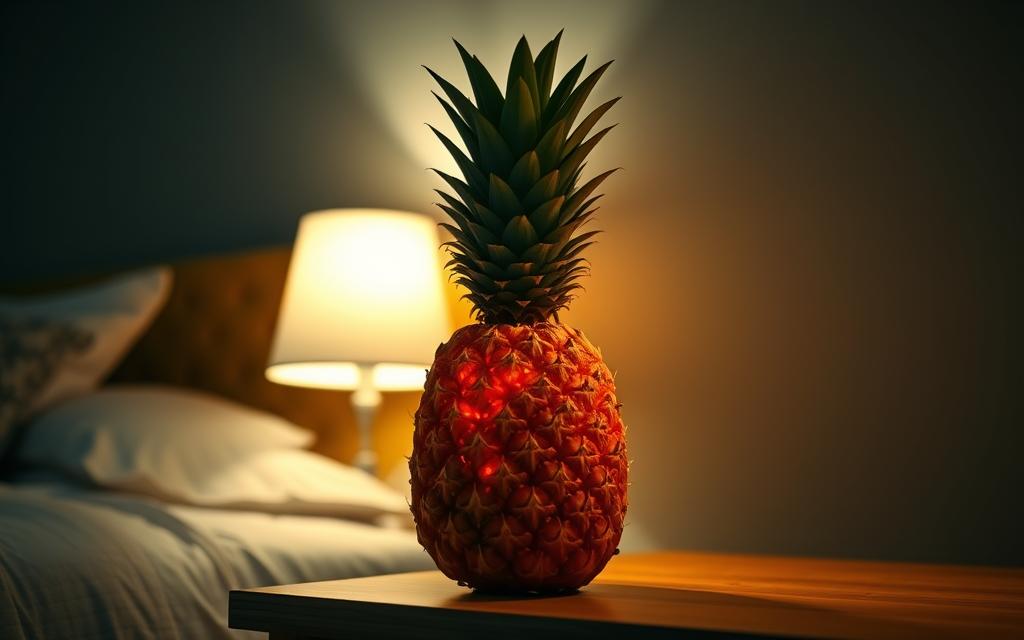
Pineapple’s 2 grams of fiber per cup helps with digestion, leading to better sleep15. Its bromelain, an anti-inflammatory, makes it a great choice for a bedtime snack15.
Bananas: The Perfect Bedtime Snack
Bananas are great for a good night’s sleep because they’re full of nutrients that help you relax. They have magnesium and potassium, which relax muscles and can stop cramps that might keep you awake. A medium banana has about 450 mg of potassium and 34 mg of magnesium, helping your muscles relax and improving sleep1617.
Eating bananas before bed can also boost serotonin levels. This helps you fall asleep faster and feel better17.
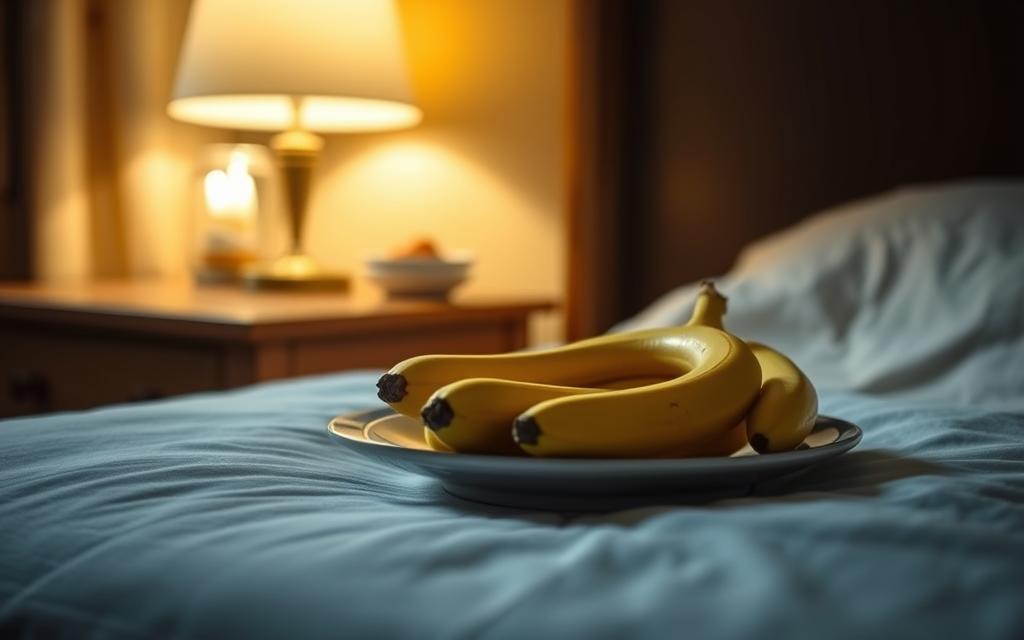
Magnesium and Potassium for Muscle Relaxation
Bananas have magnesium and potassium, which are key for relaxing muscles. One medium banana gives you about 8% of the daily magnesium you need. This is important for fighting sleep problems caused by low magnesium18.
More potassium can stop muscle cramps, which is good for people with Restless Legs Syndrome (RLS)16. Adding bananas to your bedtime routine can help you sleep better.
Tryptophan: The Sleep-Inducing Amino Acid
Bananas are also good for sleep because they have tryptophan. This amino acid is important for making serotonin and melatonin in the brain. Eating bananas can increase serotonin levels, making it easier to fall asleep and sleep better1618.
Bananas also have pectin, a fiber that keeps you feeling full. This can stop midnight hunger from waking you up17. So, bananas are a tasty way to help you relax and sleep well.
Sleep-Friendly Fruits: A Short List
A variety of fruits can help improve sleep quality. This list of sleep-inducing fruits includes oranges, papaya, and apples. Each fruit offers unique benefits for better sleep.
Oranges have natural sugars and vitamin C. They help stabilize blood sugar and reduce night awakenings19. Papaya is packed with choline, potassium, folate, and vitamins C and E. These nutrients support muscle function and the nervous system19. Apples are high in fiber, which keeps blood sugar stable at night. This reduces sleep disturbances19.
Adding these sleep-friendly fruits to your evening routine can enrich your diet and improve sleep. Adopting such healthy habits is key in fighting sleep disorders. These disorders affect over 50 million people in the U.S19..
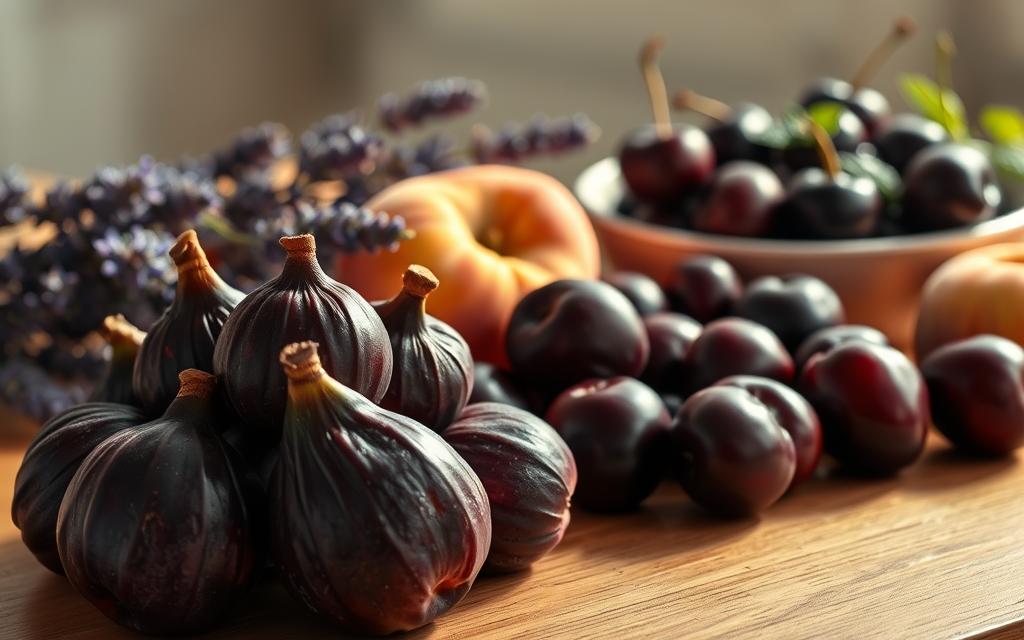
Other Foods That Enhance Sleep Quality
Many foods help improve sleep, not just fruits. Dairy like milk and yogurt has tryptophan, which boosts serotonin for better sleep. Milk from nighttime has more melatonin, helping you sleep20. Almonds are great because a study showed rats with almond extract slept longer and deeper21. Salmon, rich in healthy fats, also improves sleep, with those eating it three times a week sleeping better22.
High-fiber, low-fat meals help you sleep well. Eating these foods in the evening is best20. White rice, a high-glycemic food, can help you fall asleep faster if eaten four hours before bed22.
Adding certain foods to your diet can also help sleep. A banana with yogurt is a snack full of magnesium and tryptophan, great for sleep. Nuts, seeds, and herbs like basil can also improve your bedtime routine. These foods are key to better sleep, offering a natural way to improve your sleep quality.
| Food | Sleep-Promoting Benefits |
|---|---|
| Dairy (Milk, Yogurt) | Contains tryptophan; higher melatonin at night |
| Almonds | May promote longer, deeper sleep |
| Salmon | Improves sleep and daytime function |
| White Rice | Shortens sleep onset if consumed pre-bedtime |
| Bananas | Rich in magnesium; supports relaxation |
| Nuts and Seeds | Provide healthy fats and magnesium |
| Fresh Herbs | Promote calm and relaxation |
Adding these foods to your evening routine can improve your sleep. They are crucial for better sleep quality.
Fruits for Sleep: Combining Them with Other Sleep Aids
Looking for ways to sleep better? Mixing fruits with sleep aids like dairy, nuts, or grains can help. For example, eating two kiwis before bed can make falling asleep easier and improve sleep quality23. Adding whole grain crackers and cheese to this mix boosts the benefits of tryptophan, a key sleep helper23.
Milk, with its melatonin, pairs well with fruits like strawberries, which also have melatonin. This combo helps promote good sleep. Spinach, rich in magnesium and potassium, can also help relax and boost melatonin when mixed with fruits or in smoothies23.
For those who love nuts, try pistachios with sleep-promoting fruits. This mix not only tastes good but also increases melatonin, helping you sleep better24. A snack of cottage cheese and fruit also supports serotonin production, aiding sleep23.
In short, mixing fruits with other sleep aids is a smart way to improve sleep. These snacks not only taste great but also help you sleep better, making bedtime more relaxing.
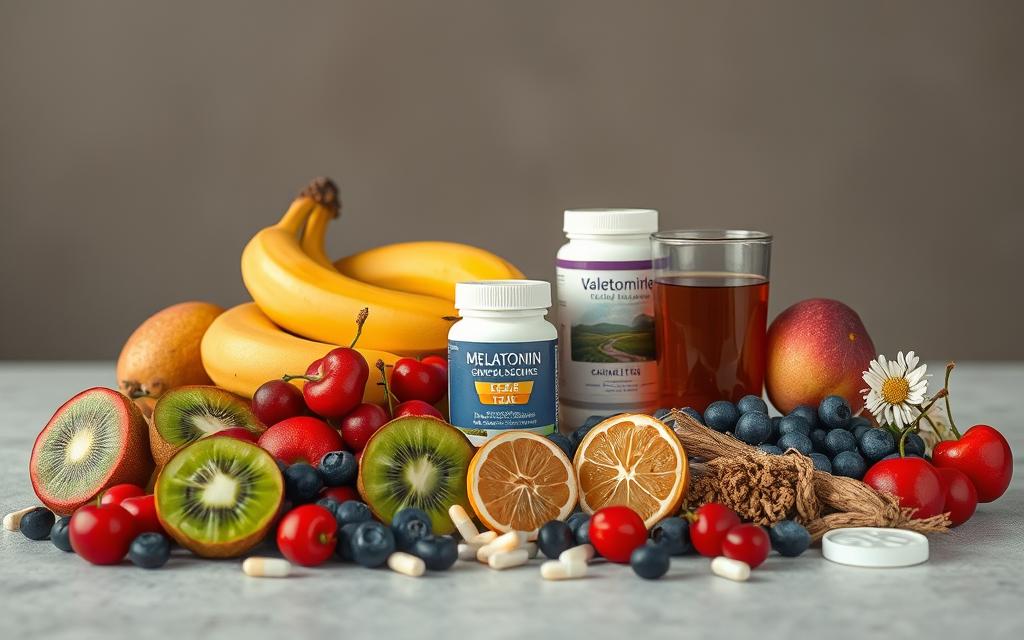
Morning vs. Night: When to Consume Sleep-Inducing Fruits
The time you eat fruits can really help you sleep better. Eating fruits before bed can make you feel sleepy. But, eating them in the morning might not have the same effect.
Foods like cherries and bananas have melatonin, which helps you sleep. They relax your muscles, too, which can stop cramps at night2526.
To get the best sleep, eat fruits like kiwi and tart cherries an hour before bed. They can make your sleep better and help you fall asleep quicker27. Even though fruits don’t raise blood sugar much, adding healthy fats or proteins can help even more26.
It’s smart to avoid foods with processed sugars and simple carbs before bed. They can make you feel too awake and then crash, which can mess up your sleep26. So, when you eat fruits is really important for better sleep and health.
Precautions When Consuming Fruits Before Bed
When thinking about eating fruits before bed, it’s important to know some precautions for eating fruits. People with diabetes or acid reflux should be extra careful. Eating fruits high in sugar before bed can cause blood sugar levels to rise, which might affect sleep28.
It’s best to wait at least two hours after eating before having fruits at night. This helps avoid stomach discomfort and keeps energy levels down, which can help you sleep better28.
Choosing fruits like apples, pears, and grapes is a good idea. They help with weight management and are low in calories28. But, eating calorie-rich fruits like bananas too close to bedtime can lead to weight gain and poor sleep28.
It’s also good to avoid foods high in saturated fat and protein before bed. They can disrupt your sleep29.
Also, eating fruits in a balanced way can help avoid insomnia, even with sweet fruits. Talking to a health advisor about the right fruits can greatly improve your sleep quality and reduce negative effects from eating fruits at night.
Tips for Incorporating Fruits into Your Evening Routine
Adding fruits to your evening can boost your sleep. Try making fruit-infused water with melatonin-rich fruits like cherries and bananas. This not only tastes better but also helps you sleep naturally. Drinking tart cherry juice before bed can also up your melatonin levels, helping you sleep better30.
Make a soothing bedtime smoothie with bananas, yogurt, and almond milk. The tryptophan, magnesium, and serotonin in these ingredients relax your muscles31. Adding oats to your recipes can also help, as they naturally increase melatonin levels for better sleep32.
Watch your portion sizes. A small bowl of berries is great for an evening snack because of their antioxidants. A small amount of almonds or pistachios can also help with sleep due to their melatonin31.
Set up a calming routine with these fruits to signal bedtime. Stay away from heavy meals and caffeine close to bed to avoid sleep disruptions. Enjoy the benefits of fruits for sleep in your evening routine for a better night’s rest.
Conclusion
Fruits offer many benefits for sleep. Eating sleep-friendly fruits can improve your sleep quality. They provide nutrients that help make sleep hormones like melatonin and serotonin.
Research shows that eating enough fruits and veggies can lead to better sleep. People who sleep well eat about 463.1 grams of these foods daily. Those who sleep less eat only 426.1 grams33.
Fruits like bananas and avocados are also good. They have potassium and magnesium. These help reduce muscle cramps and make you relax better for sleep34.
Adding more fruits to your diet can help you sleep better. For example, people who sleep well eat more fruits and veggies than those who don’t35. A bedtime routine with sleep-promoting fruits can help you sleep better.
Trying these fruits in your evening routine can help fight sleep problems. You might find a way to sleep better and feel better overall.
FAQ
What are some of the best fruits for sleep?
Kiwi, tart cherries, pineapple, and bananas are great for sleep. They have nutrients like melatonin and serotonin. These help you sleep better.
How do sleep-inducing fruits affect sleep quality?
These fruits improve sleep by offering nutrients that help regulate sleep cycles. They also promote relaxation with melatonin, serotonin, and antioxidants.
Is there a specific time to eat fruits before bed?
Eat sleep-friendly fruits 30-60 minutes before bed. This avoids digestive issues or sugar spikes that can disrupt sleep.
Are there fruits to help you sleep that may cause digestive issues?
Yes, some fruits can upset your stomach, like those high in sugar or fiber. Choose fruits that you know you can digest well before bed.
Can fruits be combined with other foods to enhance their sleep-promoting effects?
Definitely! Mixing fruits with dairy, nuts, or smoothies makes great snacks. They boost sleep benefits and offer more nutrients.
What other foods, aside from fruits, can aid sleep?
Foods like dairy, nuts, fatty fish, and whole grains also help sleep. They’re full of tryptophan, omega-3s, and antioxidants, all good for sleep.
Are there any precautions to consider when eating fruits before bed?
Yes, people with diabetes or acid reflux should talk to health advisors. Some fruits might worsen their conditions and affect sleep.
How can I incorporate sleep-friendly fruits into my evening routine?
Add these fruits to your routine with fruit-infused drinks or bedtime smoothies. Enjoying them as snacks also works. Mindful eating can help relax you before bed.
Source Links
- The trick to a better night’s sleep could be hiding in your kitchen – https://healthy.kaiserpermanente.org/health-wellness/healtharticle.foods-to-help-you-sleep
- What’s the best diet for healthy sleep? A nutritional epidemiologist explains what food choices will help you get more restful Z’s | University of Michigan School of Public Health | The Conversation | Sleep | Nutrition | Sleep Health | Diet | Healthy Food – https://sph.umich.edu/pursuit/2024posts/best-diet-for-healthy-sleep.html
- Nutrition and Sleep: Diet’s Effect on Sleep – https://www.sleepfoundation.org/nutrition
- Mediterranean Diet on Sleep: A Health Alliance – https://pmc.ncbi.nlm.nih.gov/articles/PMC9318336/
- A Mediterranean Dietary Pattern Predicts Better Sleep Quality in US Women from the American Heart Association Go Red for Women Strategically Focused Research Network – https://pmc.ncbi.nlm.nih.gov/articles/PMC7551612/
- These 3 Fruits May Help You Sleep Better – https://stvincents.org/about-us/news-press/news-detail?articleId=46505&publicid=745
- Study Finds Consuming More Fruits and Vegetables Can Improve Sleep | News | University of Michigan School of Public Health | Nutrition | Sleep | Fruits and Vegetables | Research | Faculty | – https://sph.umich.edu/news/2021posts/consuming-more-fruits-vegetables-can-improve-sleep.html
- Can Eating 2 Kiwis Before Bed Really Improve Your Sleep? – https://www.verywellhealth.com/kiwi-before-bed-for-sleep-11695315
- The Impact of Kiwifruit Consumption on the Sleep and Recovery of Elite Athletes – https://pmc.ncbi.nlm.nih.gov/articles/PMC10220871/
- Does Kiwi Help You Sleep? – https://sleepdoctor.com/nutrition/does-kiwi-help-you-sleep
- Tart cherry juice benefits: Do they live up to the hype? – https://www.osfhealthcare.org/blog/tart-cherry-juice-benefits-do-they-live-up-to-the-hype/
- Tart Cherry Juice Benefits and Effects On Sleep – https://www.turmerry.com/blogs/dreamerry/add-tart-cherries-to-diet-for-better-sleep?srsltid=AfmBOorUeBmiy1lrHhjZjrC6t7DPWUMNiIjlxr1aUelvmEovQsPn2MaQ
- Fruits that help you sleep – https://www.ajc.com/lifestyles/health/fruits-that-can-help-you-eat-your-way-sleep/mAHORGP4SiCVeAI1TFrAFL/
- Pineapple: Nutrition, Benefits, and Risks – https://www.healthline.com/nutrition/benefits-of-pineapple
- What are the health benefits of pineapple? How the fruit boosts skin, gut health, sleep – https://www.today.com/health/diet-fitness/pineapple-benefits-rcna152025
- How A Banana Before Bed Can Help You Sleep Better – Amerisleep – https://amerisleep.com/blog/banana-before-bed/
- Do Bananas Help You Sleep, and What Is the Best Time Eat One Before Bed? – https://www.medicinenet.com/do_bananas_help_you_sleep_best_time_eat_one/article.htm
- Does Eating a Banana Before Bed Help You Sleep? – https://www.healthline.com/nutrition/banana-before-bed
- 7 Fruits for a Better Night’s Sleep – https://www.sleepbetterny.com/blog/7-fruits-for-a-better-nights-sleep/
- Can’t Sleep? Check What’s on Your Plate – https://health.clevelandclinic.org/foods-that-help-you-sleep
- 9 Foods and Drinks to Promote Better Sleep – https://www.healthline.com/nutrition/9-foods-to-help-you-sleep
- The Best Foods To Help You Sleep – https://www.sleepfoundation.org/nutrition/food-and-drink-promote-good-nights-sleep
- 5 Foods That Help You Sleep Better | Ochsner Health – https://blog.ochsner.org/articles/5-foods-that-help-you-get-a-better-nights-sleep
- 14 Melatonin-Rich Foods to Eat for Better Sleep – Moon Juice – https://moonjuice.com/blogs/tips-and-tricks/foods-with-melatonin?srsltid=AfmBOoqnpEUyPdQ9dtUOmDFfJcHfqqlAgnpecI9igQSWjtROmc9fCMTR
- Eats to Help You Sleep – https://www.nm.org/healthbeat/healthy-tips/nutrition/eats-to-help-you-sleep
- Is there a best time to eat fruit? Facts and myths – https://www.medicalnewstoday.com/articles/325253
- Healthy Bedtime Snacks To Eat Before Sleep – https://www.sleepfoundation.org/nutrition/healthy-bedtime-snacks
- Eating Fruits at Night: Is It Good or Bad? – https://parenting.firstcry.com/articles/eating-fruits-at-night-is-it-healthy-for-you/
- Eating for a Good Night’s Sleep – https://extension.psu.edu/eating-for-a-good-nights-sleep
- 7 Foods to Help You Get a Great Night’s Sleep – https://www.verywellmind.com/foods-that-can-help-you-sleep-8744286
- The Top 11 Foods Promoting A Good Night’s Sleep – https://www.fccmg.com/blog/top-foods-promoting-good-night-sleep
- 14 Melatonin-Rich Foods to Eat for Better Sleep – Moon Juice – https://moonjuice.com/blogs/tips-and-tricks/foods-with-melatonin?srsltid=AfmBOoqGug-vzXOSFGN4QYxZK8i_PRasZ2hfbud4EHFygYCbb53NUNnL
- Sleep: Eating more fruits and vegetables may improve duration – https://www.medicalnewstoday.com/articles/eating-more-fruits-and-vegetables-may-lead-to-optimal-sleep-duration
- Best Fruits and Vegetables to Help You Sleep – eachnight – https://eachnight.com/sleep/best-fruits-and-vegetables-for-sleep/
- The relationship between sleep duration and fruit/vegetable intakes in UK adults: a cross-sectional study from the National Diet and Nutrition Survey – https://pmc.ncbi.nlm.nih.gov/articles/PMC5922510/
